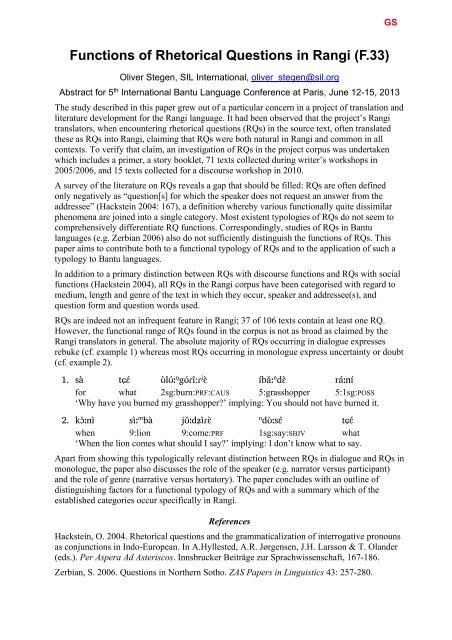here - 5th International Conference on Bantu Languages
here - 5th International Conference on Bantu Languages
here - 5th International Conference on Bantu Languages
You also want an ePaper? Increase the reach of your titles
YUMPU automatically turns print PDFs into web optimized ePapers that Google loves.
Functi<strong>on</strong>s of Rhetorical Questi<strong>on</strong>s in Rangi (F.33)<br />
Oliver Stegen, SIL <str<strong>on</strong>g>Internati<strong>on</strong>al</str<strong>on</strong>g>, oliver_stegen@sil.org<br />
Abstract for 5 th <str<strong>on</strong>g>Internati<strong>on</strong>al</str<strong>on</strong>g> <strong>Bantu</strong> Language <str<strong>on</strong>g>C<strong>on</strong>ference</str<strong>on</strong>g> at Paris, June 12-15, 2013<br />
The study described in this paper grew out of a particular c<strong>on</strong>cern in a project of translati<strong>on</strong> and<br />
literature development for the Rangi language. It had been observed that the project’s Rangi<br />
translators, when encountering rhetorical questi<strong>on</strong>s (RQs) in the source text, often translated<br />
these as RQs into Rangi, claiming that RQs were both natural in Rangi and comm<strong>on</strong> in all<br />
c<strong>on</strong>texts. To verify that claim, an investigati<strong>on</strong> of RQs in the project corpus was undertaken<br />
which includes a primer, a story booklet, 71 texts collected during writer’s workshops in<br />
2005/2006, and 15 texts collected for a discourse workshop in 2010.<br />
A survey of the literature <strong>on</strong> RQs reveals a gap that should be filled: RQs are often defined<br />
<strong>on</strong>ly negatively as “questi<strong>on</strong>[s] for which the speaker does not request an answer from the<br />
addressee” (Hackstein 2004: 167), a definiti<strong>on</strong> w<str<strong>on</strong>g>here</str<strong>on</strong>g>by various functi<strong>on</strong>ally quite dissimilar<br />
phenomena are joined into a single category. Most existent typologies of RQs do not seem to<br />
comprehensively differentiate RQ functi<strong>on</strong>s. Corresp<strong>on</strong>dingly, studies of RQs in <strong>Bantu</strong><br />
languages (e.g. Zerbian 2006) also do not sufficiently distinguish the functi<strong>on</strong>s of RQs. This<br />
paper aims to c<strong>on</strong>tribute both to a functi<strong>on</strong>al typology of RQs and to the applicati<strong>on</strong> of such a<br />
typology to <strong>Bantu</strong> languages.<br />
In additi<strong>on</strong> to a primary distincti<strong>on</strong> between RQs with discourse functi<strong>on</strong>s and RQs with social<br />
functi<strong>on</strong>s (Hackstein 2004), all RQs in the Rangi corpus have been categorised with regard to<br />
medium, length and genre of the text in which they occur, speaker and addressee(s), and<br />
questi<strong>on</strong> form and questi<strong>on</strong> words used.<br />
RQs are indeed not an infrequent feature in Rangi; 37 of 106 texts c<strong>on</strong>tain at least <strong>on</strong>e RQ.<br />
However, the functi<strong>on</strong>al range of RQs found in the corpus is not as broad as claimed by the<br />
Rangi translators in general. The absolute majority of RQs occurring in dialogue expresses<br />
rebuke (cf. example 1) w<str<strong>on</strong>g>here</str<strong>on</strong>g>as most RQs occurring in m<strong>on</strong>ologue express uncertainty or doubt<br />
(cf. example 2).<br />
1. sà tɕɛ́ ʊ̀lʊ́ːᵑgʊ́ɾî:ɾʲɛ̀ íbǎːⁿdɛ̀ ráːnɪ ́<br />
for what 2sg:burn:PRF:CAUS 5:grasshopper 5:1sg:POSS<br />
‘Why have you burned my grasshopper?’ implying: You should not have burned it.<br />
2. kɔ̀ːnɪ ̀ sìːᵐbà jʊ̌ːdʑìɾɛ̀ ⁿdʊ̀ːsɛ́ tɕɛ́<br />
when 9:li<strong>on</strong> 9:come:PRF 1sg:say:SBJV what<br />
‘When the li<strong>on</strong> comes what should I say?’ implying: I d<strong>on</strong>’t know what to say.<br />
Apart from showing this typologically relevant distincti<strong>on</strong> between RQs in dialogue and RQs in<br />
m<strong>on</strong>ologue, the paper also discusses the role of the speaker (e.g. narrator versus participant)<br />
and the role of genre (narrative versus hortatory). The paper c<strong>on</strong>cludes with an outline of<br />
distinguishing factors for a functi<strong>on</strong>al typology of RQs and with a summary which of the<br />
established categories occur specifically in Rangi.<br />
References<br />
Hackstein, O. 2004. Rhetorical questi<strong>on</strong>s and the grammaticalizati<strong>on</strong> of interrogative pr<strong>on</strong>ouns<br />
as c<strong>on</strong>juncti<strong>on</strong>s in Indo-European. In A.Hyllested, A.R. Jørgensen, J.H. Larss<strong>on</strong> & T. Olander<br />
(eds.). Per Aspera Ad Asteriscos. Innsbrucker Beiträge zur Sprachwissenschaft, 167-186.<br />
Zerbian, S. 2006. Questi<strong>on</strong>s in Northern Sotho. ZAS Papers in Linguistics 43: 257-280.<br />
GS


